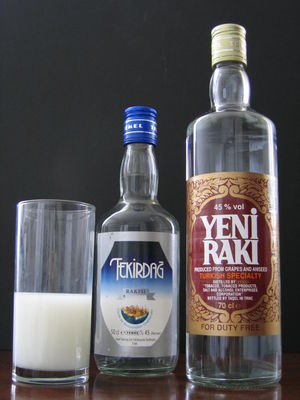 Cheers! Turkish Raki
Cheers! Turkish RakiESKILER ALIYORUM
ALIP YILDIZ YAPIYORUM
MUSIKI RUHUN GIDASIDIR
MUSIKIYE BAYILIYORUM
SIIR YAZIYORUM
SIIR YAZIP ESKILER ALIYORUM
ESKILER VERIP MUSIKILER ALIYORUM
BIR DE RAKI SISESNDE BALIK OLSAM.
ORHAN VELI KANIK
From Mavi Boncuk |
Cheers
When one thinks of Turkey or Turks, one is reminded of Raki. Although it is not known where or when this drink was invented, it is certain that the history of raki does not go as far back as wine or beer. There are many proverbs on raki which is the traditional Turkish drink. Raki is made from different fruits in different regions, but grapes, figs and plums are the main ones.
In the near and middle east countries the drink is known by different names such as Araka, Araki, Ariki which obviously come from the same origin. Some claim that it is called Iraqi (from Iraq) because it was first made in this country and spread to other regions. Others say it got its name from the razaki grapes used in producing it. Both theories are acceptable. Another theory is that arak in Arabic means "sweat" and araki " that which makes one sweat." If one drinks too much raki one does sweat and when raki is being distilled it falls drop by drop like sweat, so the name could have come from Arabic. In neighboring countries different kinds of raki have different names. In Greece gum is added to it and the drink is called "Mastika". Duziko which comes from the slavic word "Duz" means raki with aniseed. In Turkey, raki made from grape residue used to be called Düz Raki or Hay Raki. Zahle raki has taken this name because it is made in the city of Zahle in Lebanon. Raki is not a fermentation drink like wine and beer but a distillation drink, so more technical knowledge and equipment are necessary for its production. Encyclopedias write that in "Eastern India a drink produced by distilling fermented sugar cane juice is called "arak" and the same name is given Ceylon and Maleysia to an alcoholic drink made by the distillation of the juice of the palm tree. It is also noted that in Iran the drink made in the same way from grapes and dates is also called arak.
The drink made in Anatolia and known as Turkish raki has a history going back 300 years. The art of distillation which started in the Arab world and spread to the neighboring countries was implemented when people thought of making use of the sugar in the residue of wine processing. With the addition of aniseed, raki took on its Turkish characteristic. The famous Turkish traveler Evliya Çelebi listed the artisans of Istanbul in the first volume of his book on his voyages which he wrote in 1630. Among the artisans he also mentioned the arakmakers. While writing that arak was made from all kinds of plants, he also mentioned the word raki and said that drinking even one drop of this intoxicating drink was sinful. It is known that at that time in Istanbul 300 people in 100 workshop were occupied in the production and sale of this drink. Evliya Çelebi spoke of tavern-keepers as "accursed, ill omened, blame worthy" and said there were taverns all over Istanbul but especially in Samatya, Kumkapi, Balikpazari, Unkapani, Fener, Balat and the two shores of the Bosphorous and added "Galata means Taverns". Evliya Çelebi recorded the small wine shops and the kinds of wine they sold and also mentioned the taverns that sold raki, all kinds of raki, like raki wine, banana raki, mustard raki, linden raki, cinnomon raki, clove raki, pomegranate raki, hay raki aniseed raki.
Club Raki
Club Raki is a Turkish specialty made with raisin neutral spirits and with anis oil added. Distilled and bottled in Istanbul, Turkey, this fine spirit is excellent when served chilled with any meal and goes with every occasion.
Yeni Raki
Yeni Raki is an aniseed flavored spirit drink obtained by distilling Suma (raisin distillate) in traditional copper distilling stills. Suma used in the production of raki is a grape-origin distillate, distilled up to maximum 94.5 % alcohol by volume in order to protect the taste and smell of the grape. Yeni Raki can be taken straight or spring water half and half; but it is always drunk cold (must be served chilled 8-10°C). A smooth and cylindrical glass used in drinking raki is ideal for enjoying magical whitening in the mixture of raki and water. Yeni Raki, can be taken as an aperitif, but it is recommended to drink raki, in line with Turkish drinking tradition, together with original cold and hot dishes and to fill cooled glass with raki by 1/3 and water by 2/3. While sipping this tasteful product, you will find in grape and anise flavor the traces of Anatolian Culture



